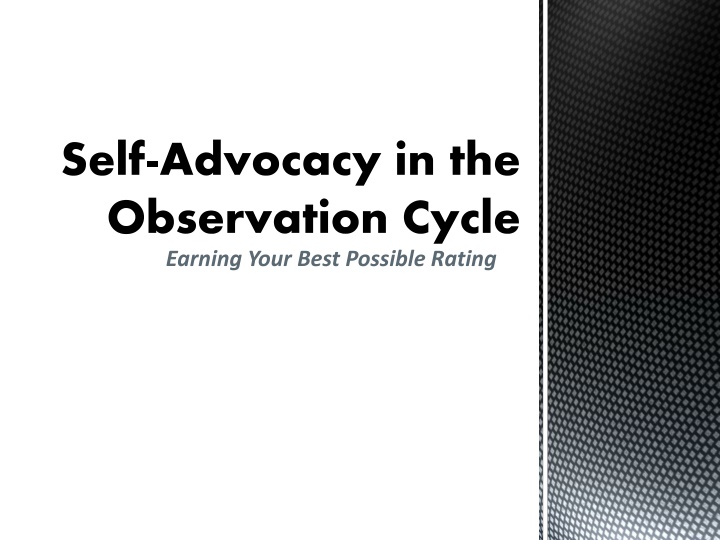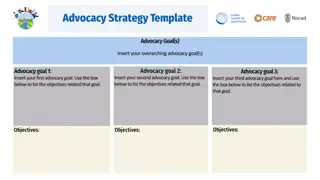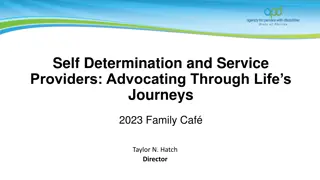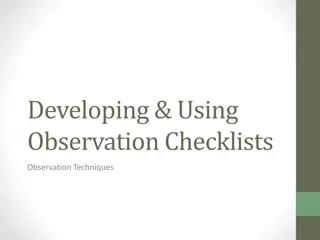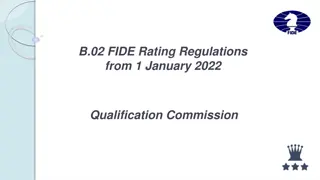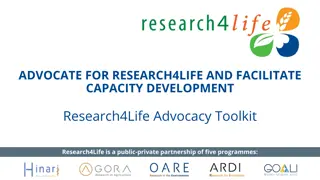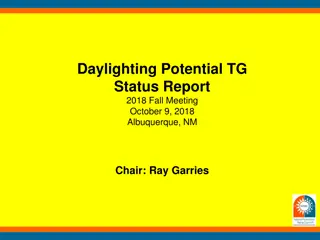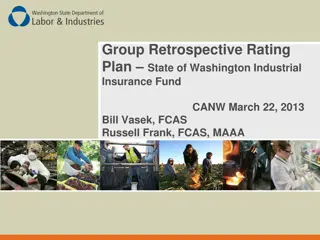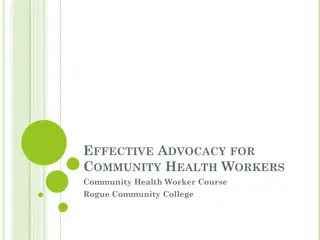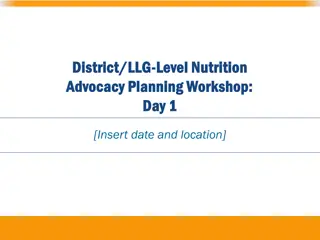Self-Advocacy in the Observation Cycle: Earning Your Best Possible Rating
In the observation cycle, self-advocacy plays a crucial role in achieving a favorable rating. Learn how to effectively communicate your interests, needs, and rights while showcasing your classroom practices. Understand the process and importance of advocating for yourself during evaluations to maximize your potential rating.
Download Presentation

Please find below an Image/Link to download the presentation.
The content on the website is provided AS IS for your information and personal use only. It may not be sold, licensed, or shared on other websites without obtaining consent from the author.If you encounter any issues during the download, it is possible that the publisher has removed the file from their server.
You are allowed to download the files provided on this website for personal or commercial use, subject to the condition that they are used lawfully. All files are the property of their respective owners.
The content on the website is provided AS IS for your information and personal use only. It may not be sold, licensed, or shared on other websites without obtaining consent from the author.
E N D
Presentation Transcript
Self-Advocacy in the Observation Cycle Earning Your Best Possible Rating
SELF-CONSCIOUS EMPOWERED Personal Reflection: How do administrator observations make you feel? Under-valued BULLIED
Session Objectives *Understand the importance of self-advocacy. *Identify ways that teachers can become better self-advocates during the observation cycle. *Gather resources that can be shared with members back at your worksite.
The observation cycle has been designed to incorporate the elements of the NEAT process into the post-observation conference and reflection process. In the event that a principal determines that a teacher is performing at an Unsatisfactory or Developing/Needs Improvement level, the procedures outlined in Article VII, Section H-6 shall be implemented to the extent they are not included or already covered by the formal observation cycle. Teachers are entitled to union representation in meetings scheduled outside of the formal evaluation/observation cycle to discuss the teacher s performance. Instructional Master Contract Implementation of the Student Success Act MOU Section E, #3
What is Self-Advocacy? Self-advocacy is NOT: *A defensive, knee-jerk reaction *A knock-down, drag-out argument *An attack on the administrator s professional assessment Self-Advocacy IS: *Speaking confidently of your classroom practices *Showing the administrator what they may not have seen *Shining a light on the positive while demonstrating an awareness of growth opportunities Self-advocacyrefers to an individual s ability to effectively communicate, convey, negotiate or assert his or her own interests, desires, needs, and rights.
Instructional Master Contract Implementation of the Student Success Act MOU Tentative Agreement http://www.pasco.k12.fl.us/er/contracts/it-08-10-15
2015-16 Observation Overview New Electronic Observation Platform DP (narrowed focus) Now includes Domain 3 in additive points Still required to create the DP Plan Two observations One formal in Fall, One informal in Spring Scored individually, then averaged Domain1 finished before May Domains 2-4 will be monitored throughout the year Collect artifacts as you go Take advantage of mid-year feedback; identify elements that may be underrated and supplement evidence
Choosing Deliberate Practice *Narrowed to 8 target elements: #1 Providing Rigorous Learning Goals & Performance Scales #6 Identifying Critical Content #11 Helping Students Elaborate on New Content #12 Helping Students Record and Represent Knowledge #17 Helping Students Examine Similarities & Differences #18 Helping Students Examine Their Reasoning #20 Helping Students Revise Knowledge #22 Engaging Students in Cognitively Complex Tasks Involving Hypothesis Generation and Testing Choose your deliberate practice element with your resources and administrator in mind Focus on growth opportunity Remember that you can ask for an additional observation to be conducted at a SPECIFIC time if the administrator is unable to score your DP in the two observations
Formal Observation Cycle Fall Pre-conference is optional One week window for observation Full lesson observed Feedback within 10 days Post-conference required
Why Pre-Conference? Establish rapport Make admin aware of behavioral challenges Clarify where DP and PLC work will be most noticeable Steer admin toward the day and class that will be the most likely place that they will see evidence of deeper content learning
What should I emphasize? According to the district, your pre-conference discussion is an opportunity to provide a general overview. Focus on describing routine events, classroom management, and common strategies that you use to monitor progress toward goals.
Between Pre-conference and Observation Lesson plans Incorporate documentation that addresses Domain 2 elements Strategic implementation of Target Elements Know and use the interview questions your students could be asked so they won t be stumped
Immediately After Observation Make notes about the lesson that was observed Focus on DQ5, DQ7, DQ8, & DQ9 Any particular relevant student behaviors Any moments that you thought went very well Any difficulties and how you addressed them If not collected in advance, revisit and revise the lesson plan to ensure it addresses Domain 2 elements Review observation feedback and gather artifacts tied to scored elements Consider student work samples Take pictures of classroom
Post-Conference Within 10 days, but as close to observation as possible, you should have feedback on the observation Request by email if 5 days without feedback Complete the post-conference form online Bring Evidence & Artifacts Be prepared to speak confidently about the learning strategies used during the lesson
Informal Observation Spring Completely Unannounced Full lesson observed Feedback within 10 days Post-conference recommended
Informal Observation Be Proactive! Encourage your administrator to drop in during particularly interesting lessons Don t forget to use your pass if you sense it won t go well invoke the dead dog clause
Domains 2-4: Collecting and Presenting Evidence Start early and make a regular habit of adding evidence to the electronic observation platform throughout the year Look for the mid-year Domains 2-4 feedback at the beginning of Semester II; ask for a conversation to help clarify what your administrator might be looking for in these Domains DON T QUIT! This is a year-long observation, so be mindful August - June
Domain 2 Evidence Examples Daily & Unit Lesson Plans ESOL & ESE Accommodations Communications w/ resource staff Samples modified work ESOL Strategy Sheets Data tracking for sub-groups (PLC) PLC Assessment Reflection Forms Canvas or other online communication options Assessments
Domain 3 Evidence Examples DP in MyPGS Self-assessment Plan Reflections PD Transcript (screenshot) Post-Conference Reflection Forms Assessment Reflection Tools Reflection on Why using the problem solving cycle
Domain 4 Evidence Examples Evidence of collaborative planning Email communication samples Online presence, website Parent/student contact log Mentor logs SDS records PLC communications Duty roster Esembler Student anecdotals Calendar of additional/volunteer contributions Open House District & Schools Committees Lunch n Learns
You Have Control!!! Perhaps more than you think .
Scoring The Domains For Domain 1 (60% of Status Score): A. Highly Effective All requirements for Effective and at least 15% of scorable elements in Domain One at Level 4 (Innovating) in 2015-2016, and 25% in 2016-2017. B. Effective At least 60% of scorable elements at Level 3 (Applying) or higher. C. Developing/Needs Improvement Less than 60% of scorable elements at Level 3 (Applying) or higher and less than 50% of scorable elements at Levels 0 and/or 1 (Beginning and/or Not Using). D. Unsatisfactory At least 50% of scorable elements at Levels 0 and/or 1 (Beginning and/or Not Using). For Domain 2 (30% of Status Score) and Domain 4 (10% of Status Score): A. Highly Effective At least 65% of scorable elements at Level 3 (Applying) and no scorable elements at Levels 0 and/or 1 (Not Using and/or Beginning). B. Effective At least 60% of scorable elements at Level 3 (Applying) or higher. C. Developing/Needs Improvement Less than 60% of scorable elements at Level 3 (Applying) or higher and less than 50% of scorable elements at Levels 0 and/or 1 (Beginning and/or Not Using). D. Unsatisfactory At least 50% of scorable elements at Levels 0 and/or 1 (Beginning and/or Not Using).
Calculating Instructional Practices Score Domain 1 Average: 2.5 x .60= 1.5 Semester I Observation: Effective (3.0) Semester II Observation: Needs Improvement (2.0) Domain 2: 4.0 x .30= 1.2 Domain 4: 3.0 x .10= .3 Status Score= 3.0
Calculating Instructional Practices Score Deliberate Practice: Domain 3 Deliberate Practice Goal 3 Element 50: 3 Element 51: 3 Element 52: 4 Element 53: 4 Element 54: 4 3.5 x .15=.53 Instructional Practices Score= 3.0+.53= 3.53
Self-Advocacy Makes A Difference Help EMPOWER your colleagues to become strong, confident self- advocates! Share these resources with USEP members!
Questions, Comments & Feedback? Please don t forget to complete the evaluation form for this session Follow up with us: Val Smith, vsmith@useponline.org Don Peace, dpeace@pasco.k12.fl.us
